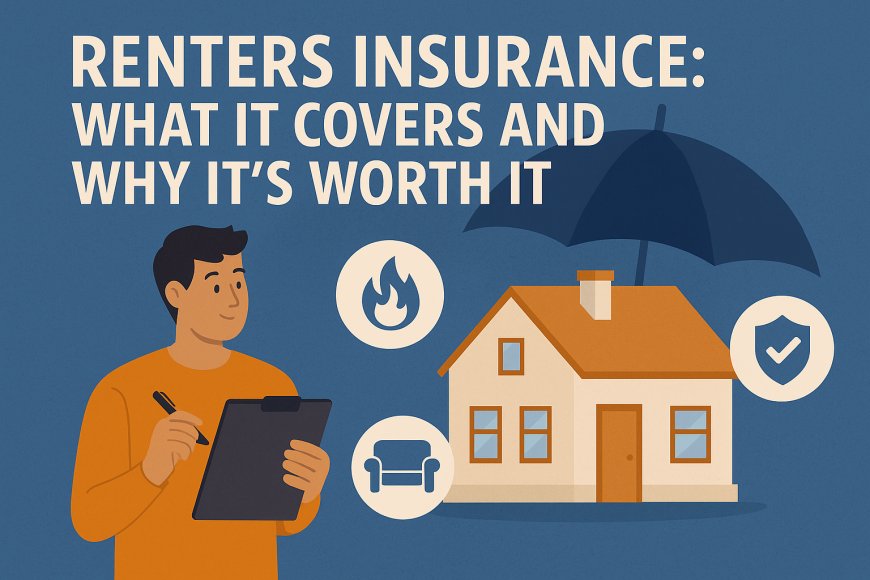: Renters Insurance: What It Covers and Why It’s Worth It
Discover what renters insurance really covers, why it’s essential even if you don’t own a home, and how it protects your finances and belongings in the U.S.

Why Renters Insurance Matters
Many renters in the U.S. assume that their landlord’s insurance policy protects their personal belongings, but that’s a costly misunderstanding. Landlord insurance typically covers the building itself—not your furniture, electronics, or valuables. That’s where renters insurance steps in, offering affordable and often overlooked protection that can be a financial lifesaver.
What Renters Insurance Actually Covers
Renters insurance is designed to cover your personal property, liability risks, and temporary living expenses if your rental becomes uninhabitable due to a covered event. Here's a breakdown:
Personal Property Protection
This is the core of renters insurance. It covers your belongings—clothes, electronics, furniture, kitchenware, etc.—if they’re damaged or destroyed by events like fire, smoke, theft, vandalism, water damage from a burst pipe, or windstorms. Most policies cover your items even when you’re away from home, such as if your laptop is stolen from your car or a hotel room.
Liability Coverage
Renters insurance typically includes liability protection if you accidentally cause injury to someone else or damage to their property. For instance, if your dog bites a guest or your kitchen fire damages your neighbor’s apartment, this portion can cover legal fees and settlements, usually up to $100,000 or more.
Loss of Use or Additional Living Expenses
If your rental unit becomes uninhabitable due to a covered event (like a fire), renters insurance can pay for hotel stays, temporary rentals, and meals while you’re displaced. This is known as "loss of use" coverage.
Medical Payments to Others
Separate from liability protection, this covers minor medical costs if someone gets hurt on your property, even if it’s not your fault. Think of it as a goodwill buffer that can help prevent lawsuits.
What It Doesn’t Cover
Renters insurance doesn’t cover everything, and knowing the limitations is crucial. For example, it usually won’t protect you from:
-
Floods and earthquakes (these often require separate policies)
-
Pest infestations like bed bugs or mice
-
High-value items above standard limits, such as expensive jewelry or artwork, unless you purchase additional coverage or endorsements
-
Intentional damage or illegal activity
Always read the fine print. The more you understand your policy, the better prepared you'll be when something unexpected happens.
Actual Cash Value vs. Replacement Cost
When selecting a renters policy, you’ll often choose between actual cash value (ACV) and replacement cost coverage. ACV reimburses you for the depreciated value of your items—what they were worth at the time of loss. Replacement cost pays for brand-new items at current market prices. While replacement cost premiums are higher, the payout is more generous and better aligned with what you’d actually spend replacing your belongings.
Who Should Get Renters Insurance?
The answer is simple: anyone who rents a home, apartment, condo, or room. Whether you're living solo in a studio or with roommates in a shared house, you have possessions and liability exposure. Even college students living off-campus should consider a policy, especially if their parents' homeowners insurance doesn’t extend coverage.
How Much Does Renters Insurance Cost?
Renters insurance is among the most affordable types of coverage available. On average, it costs between $10 and $25 per month, depending on your location, coverage amount, and deductible. In high-risk areas or if you add extra riders, premiums might increase slightly—but the value far outweighs the cost.
How to Choose the Right Policy
When shopping for a renters insurance policy, here are some important tips:
-
Inventory Your Belongings: Make a list of your possessions, including estimated values and photos. This will help you choose appropriate coverage limits.
-
Compare Quotes: Use online comparison tools or speak to an insurance broker to evaluate multiple carriers.
-
Bundle for Discounts: If you already have auto insurance, bundling it with renters insurance from the same provider can unlock discounts.
-
Understand the Deductible: Choose a deductible amount that balances affordability with out-of-pocket risk.
-
Ask About Exclusions: Clarify what isn’t covered and whether you need add-ons like flood protection or scheduled personal property coverage for high-value items.
Why It's Worth It
Without renters insurance, a single fire or theft could wipe out thousands of dollars’ worth of property—without any recourse. Even more concerning is the risk of a liability lawsuit, which could bankrupt someone without coverage. For a modest monthly fee, renters insurance provides peace of mind that your finances are protected from life’s unexpected mishaps.
Final Thoughts
Renters insurance is one of the smartest and most accessible financial safeguards you can invest in. Whether you’re a recent college grad, a working professional, or a family renting a home, this small expense can offer massive protection. Don’t wait for disaster to strike. Take inventory, compare options, and get covered. Your future self will thank you.










































































